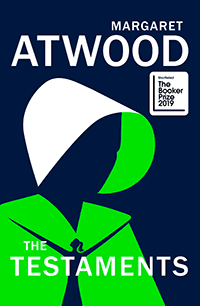![]()
95
 The Testaments
The Testaments
Margaret Atwood
Nan A. Talese/Doubleday, 2019
The Handmaid's Tale came as a shocking harbinger of horror in 1985, leaving those of us who read it aghast at its dystopian vision while feeling increasingly anxious over the growing Christian right's Moral Majority taking hold in the US. That particular organization has since disbanded but to come was an even more radical evangelical movement, currently wielding influence with the current "Commander"- in-chief. With the TV series, first appearing in 2017, a whole new generation has been exposed to the evils of Gilead, more prescient than ever, giving rise to protesters wearing the handmaids' red cloaks and white bonnets at many a rally to make a case against the current administration's rollback on women's rights. I watched season one of the series and I did not want it to continue. That ended, just as the book, on a powerfully ambiguous note. Where could it go from there? But, I did continue watching. And I'm glad I did. I'm thankful for the continued reminder of what can happen if we are not constantly vigilant.
Of course, as we head into season four, one wonders where it all ends. Atwood first resisted writing a sequel, but she relented and hence we have The Testaments. I hesitate to say much at all about the plot as many surprises are in store, but I will say that Offred is not our narrator and hardly figures in. Rather there are three narrators: a teenager in Gilead, coming of age for a pre-arranged marriage with a Commander; and growing up on the other side of the border, a teen in Canada; and, lo and behold, Aunt Lydia, speaking to us through her writing. It is hard to picture Aunt Lydia with her "yellow teeth" and "a big mole on her chin" as the reader can't help seeing Ann Dowd. And that is OK. We like seeing Ann Dowd, and anyway everyone else is fresh and new.
The time is fifteen years later and nothing much has happened in Gilead. But change is in the wind. More and more handmaids are escaping to Canada, and Mayday operatives are active, aiding and abetting the Underground Femaleroad. Of course, Gilead is active, too, sending Pearl Girls to Canada, in two's like Mormon missionaries, to convert the wicked in Sodom and bring them back stateside. Their best luck is with the homeless as Canada, for all its democracy, is not without problems.
And so we watch as these three narrators' lives converge in an explosive turn of events. Atwood answers all of our questions, leaving nothing to the imagination. Gone is that haunting, suspenseful ending of the first book, but the only way forward is for closure. As for the TV series, it has fifteen years to fill in while it takes us to the end. Knowing what's coming spurs me on to watch. I hear that season four may introduce the Pearl Girls.
The Testaments, winner of the 2019 Booker Prize (along with Bernardine Evaristo for Girl, Woman, Other) is a riveting read, a real page-turner, its message as urgent as ever. How fortunate we are to have Margaret Atwood as a guiding light in our lives. And if this second novel proves as prophetic as the first, we can dare to hope. JA
© 2019 tbr
This review may not be archived, reproduced or distributed further without the author's express permission.
Please see our conditions of use.
The Barcelona Review is a registered non-profit organization